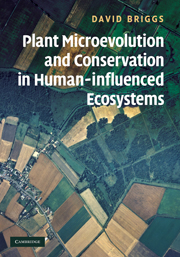Book contents
- Frontmatter
- Contents
- Preface
- Acknowledgements
- List of abbreviations
- 1 Introduction
- 2 Studying change
- 3 Key concepts in plant evolution
- 4 The origin and extent of human-influenced ecosystems
- 5 Consequences of human influences on the biosphere
- 6 Categories
- 7 Investigating microevolution in plants in anthropogenic ecosystems
- 8 Plant microevolution in managed grassland ecosystems
- 9 Harvesting crops: arable and forestry
- 10 Pollution and microevolutionary change
- 11 Introduced plants
- 12 Endangered species: investigating the extinction process at the population level
- 13 Hybridisation and speciation in anthropogenically influenced ecosystems
- 14 Ex situ conservation
- 15 In situ conservation: within and outside reserves
- 16 Creative conservation through restoration and reintroduction
- 17 Reserves in the landscape
- 18 Climate change
- 19 Microevolution and climate change
- 20 The implications of climate change for the theory and practice of conservation
- 21 Overview
- References
- Index
14 - Ex situ conservation
Published online by Cambridge University Press: 05 June 2012
- Frontmatter
- Contents
- Preface
- Acknowledgements
- List of abbreviations
- 1 Introduction
- 2 Studying change
- 3 Key concepts in plant evolution
- 4 The origin and extent of human-influenced ecosystems
- 5 Consequences of human influences on the biosphere
- 6 Categories
- 7 Investigating microevolution in plants in anthropogenic ecosystems
- 8 Plant microevolution in managed grassland ecosystems
- 9 Harvesting crops: arable and forestry
- 10 Pollution and microevolutionary change
- 11 Introduced plants
- 12 Endangered species: investigating the extinction process at the population level
- 13 Hybridisation and speciation in anthropogenically influenced ecosystems
- 14 Ex situ conservation
- 15 In situ conservation: within and outside reserves
- 16 Creative conservation through restoration and reintroduction
- 17 Reserves in the landscape
- 18 Climate change
- 19 Microevolution and climate change
- 20 The implications of climate change for the theory and practice of conservation
- 21 Overview
- References
- Index
Summary
In their introduction to the Plant Red Data Book of endangered species, Lucas and Synge (1978, 31) concluded: ‘Botanic gardens…are poised to play a major role not only in cultivating the [endangered] plants concerned, but also in their re-introduction, in habitat management and even in owning and maintaining small reserves for particular species.’ Moreover, they predict: ‘once the individual facts on threats, habitats sites and populations are known, successful conservation of most plant species is likely to prove far less difficult and costly than that of animals’. After 30 years, it is timely to review the role of botanic and other gardens in the conservation of endangered species, and to examine current views on these predictions.
The use of the phrase ‘poised to play a major role’ suggests that the use of botanic gardens for the conservation of wild endangered species represented something of a new direction for gardens in the 1970s and 1980s (Lucas & Synge, 1978). For what purposes were botanic gardens founded in the first place, and how have they developed historically? What have theoretical investigations and practical studies revealed of the ‘strengths and weaknesses’ of gardens in their proposed new role? Given the ‘costs’ associated with ex situ conservation, endangered species are generally grown in botanic gardens and arboreta. What are the likely consequences of such cultivation?
- Type
- Chapter
- Information
- Publisher: Cambridge University PressPrint publication year: 2009



